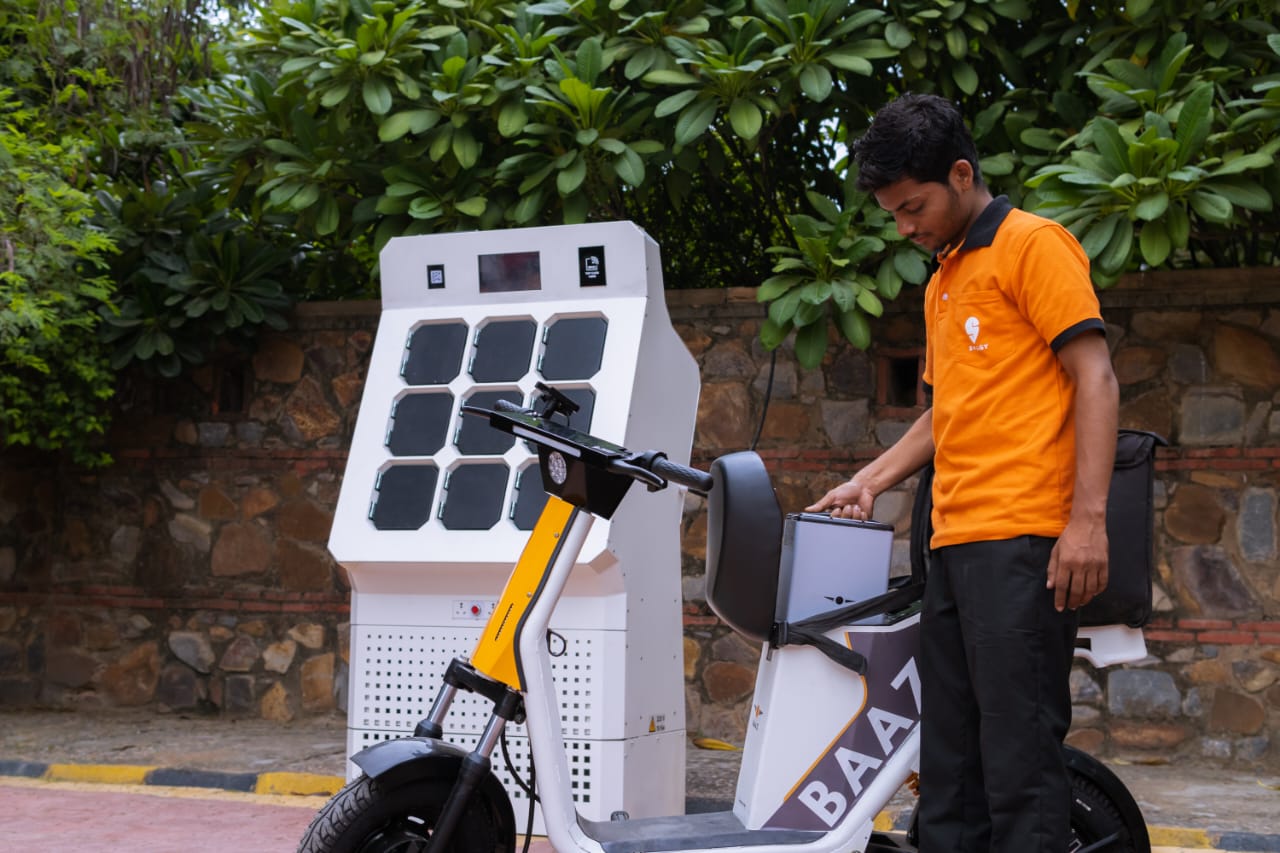
TIME SAVING: Option to change batteries instead of waiting for hours to get the vehicle charged has helped many gig workers save time
Sanjay Kumar, a 24-year-old delivery executive with Zepto, a delivery startup, has been using an EV bike for more than two years to deliver food around south Delhi.
“Earlier, it (EV bike) did not make such sense. Yes, I was able to save money compared to a petrol/diesel bike. But I had to wait for a long time to charge my bike battery,” he explains while swapping batteries at a charging point near Saket.
Three months ago, Kumar changed to a newer bike which allowed him to swap batteries instead of relying on charging.
“This has increased my working hours significantly. I am able to earn more,” he adds.
Kumar is not alone. Many gig workers like him such as delivery executives, cab riders/drivers are shifting to battery-powered vehicles.
In August 2020, the Delhi government introduced the Delhi EV policy, with an ambitious target of 25% EV penetration across all vehicle segments by 2024.
The policy also aims to take the share of electric buses in the public transport bus fleet to 70% by 2025.
The policy aims to make New Delhi “the EV capital of India”.
Chief Minister Arvind Kejriwal had then described the policy as a step towards reducing pollution levels in the city. Since the introduction of the 2020 EV policy, Delhi EV fleet has increased manifold.
Currently, of all the vehicles registered in Delhi, over 12% are powered by electricity. Though the average is not the same and differs across different categories, this jump has been possible thanks to the arrival of new startups in the electric vehicle segment.
Baaz bikes, a Delhi-based startup, is one such. The startup is part of Delhi’s electrification race from 2019.
“The commercial two-wheeler and three-wheeler EV segment has seen an exponential jump because of the policy push and consumer behaviour,” says Anubhav Sharma, CEO of Baaz Bikes, a startup focusing on EV eco-system for gig workers.
Electric vehicles offer better margins to gig workers who use bikes and three wheelers for commercial purposes.
“The profits are as high as five-fold. With impetus from the government, Delhi is likely to become the EV capital of India,” Sharma adds on EV’s rise in Delhi.
Recently, Delhi Chief Minister (CM) Arvind Kejriwal approved a new policy that aims to electrify the fleet of cab aggregators and delivery service providers in the national capital.
“Today, I have given my approval to the historic scheme. It marks a significant milestone in Delhi’s fight against pollution. We are committed to taking all possible measures to improve transport services for the people of Delhi, while promoting green, sustainable urban mobility,” Kejriwal had said while approving the policy.
With this, Delhi has become one of the few cities globally to set a time-bound threshold for transition of commercial fleet of both delivery and cab aggregators to electric vehicles (EVs). Under the new policy, the target for introduction of new EVs in aggregators’ fleet has been set at 100%.
As much as 10% of the aggregators’ new three-wheeler fleet has to be electrified within six months.
Subsequently, the number will increase to 50% in two years and 100% in four years.
Similarly for delivery service providers, the target for two-wheelers and three-wheelers has been set at 10% for the first six months . The number subsequently increases to 50% at the end of two years and 100% in four years.
“Delhi’s transition to EV has been very swift, especially in commercial vehicles sector. Buta lot more needs to be done. Compared to the rest of the country, Delhi has much better infrastructure,” said Amit Bhatt, managing director, International Council on Clean Transportation (ICCT), a think-tank working on E-mobility.
“If we want to achieve our Net Zero (carbon emission) target of 2070, we need to make transport net zero latest by 2045. Delhi, with its exemplary EV policy, has set the ball rolling,” he added on the Delhi EV policy.
Bhatt wants the government to include the heavy commercial vehicles in the policy.
“Right now, the policy does not have much emphasis on big commercial vehicles. Since commercial vehicles like trucks and loading vehicles contribute almost one-third of the vehicular pollution in Delhi, it would be better to include them at the policy level,” emphasised Bhatt.
Police rescue three-year-old from kidnapper in Ashok Vihar; factory worker arrested
Doctors say early diagnosis, IVF and specialised high-risk care helped ensure a safe delivery despite…
Police arrest a 19-year-old and four juveniles for allegedly stabbing a 25-year-old in retaliation for…
Batting coach Sitanshu Kotak backs struggling opener Abhishek Sharma and No.3 Tilak Varma, saying there…
Delhi High Court grants bail to man accused after former partner’s suicide, says mere breakup…
Heroin worth Rs 6 crore seized in Dilshad Garden; 23-year-old peddler with alleged family links…